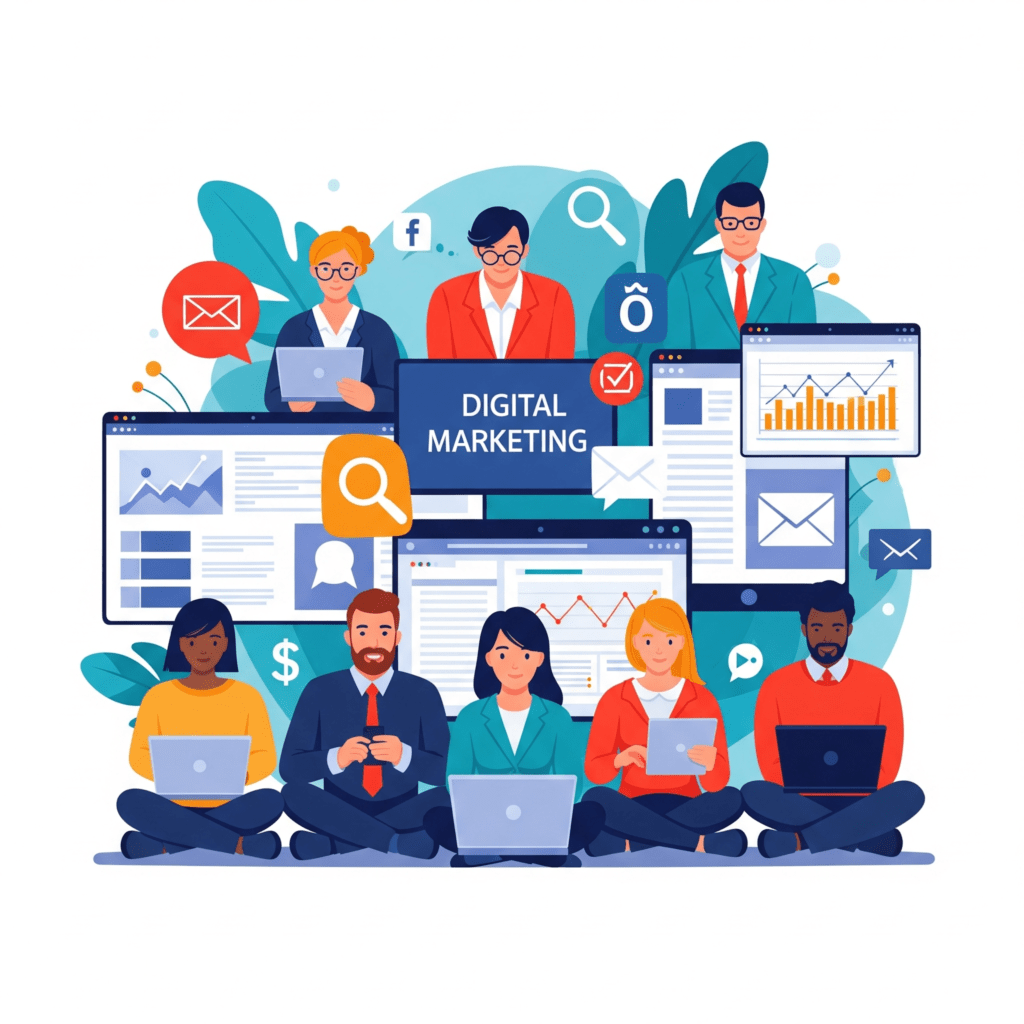Table of Contents
What is Digital Marketing? A Complete Guide for 2025

Introduction
Hello and welcome to TheNextDigital’s guide to Digital Marketing in 2025! If you’re an inquisitive newcomer, a small business wanting to grow your brand, or just looking for a new direction in your career, this guide covers all the key areas of digital marketing — in plain, real-life, human language.
1. What is Digital Marketing?
Digital marketing is the process of promoting anything — a service, product, brand, or even yourself — using the internet and digital resources. From the ad on your favorite YouTube video to the emails you receive from online shops, it’s all part of the digital marketing universe.
Example:
You open a handcrafted skincare business. Rather than just having friends or using local retailers, you open up a website, create reels on Instagram, spend some money on focused advertising, and send out informative skincare tips through email. That’s digital marketing in action.
2. Why Digital Marketing Matters in 2025
Let’s be honest — people spend hours online. Whether it’s researching products, watching videos, reading reviews, or just scrolling, your customers are already online. If you’re not there, you’re missing out.
- People trust brands they find online
- Most buying decisions start with a Google search
- Mobile-first is no longer optional — it’s a must
Digital marketing puts your business where your audience already is.
3. Traditional Marketing vs. Digital Marketing
| Feature | Traditional | Digital |
| Reach | Local or limited | Global and targeted |
| Cost | Typically costly | Possible on any budget |
| Feedback | Sluggish or vague | Instant and quantifiable |
| Engagement | One-way | Two-way dialogue |
| Flexibility | Slow to change | Real-time updates possible |
4. Key Benefits of Digital Marketing
- You control the budget
- You can monitor what’s working (and fix what’s not)
- You can customize your messages
- You can target people across cities, countries — even continents
- You build relationships, not just customers
5. Core Channels of Digital Marketing
- SEO (Search Engine Optimization)
- Content Marketing
- Social Media Marketing
- Email Marketing
- PPC Advertising
- Influencer and Affiliate Marketing
- Video Marketing
- Mobile & SMS Marketing
6. Search Engine Optimization (SEO)
SEO is all about ensuring your website appears when a person searches for what you provide.
Key Elements:
- Keyword matching user intent
- Easy-to-read, helpful website content
- Quick, mobile-friendly pages
- Backlinks from reputable websites
Simple Tip: Create blog posts that provide the exact answers your customers are searching for on Google.
7. Content Marketing: The Heart of Connection
Human beings trust brands that provide helpful content. Content marketing is all about being useful first, then promotional.
Content types:
- Blogs
- Infographics
- How-to content
- Customer testimonials
- Podcasts
Pro Tip: Try to solve the problem. The more value you provide, the more you’ll build trust.
8. Social Media Marketing: Building Community
Social media makes brands human. It’s where you bond, listen, and interact with your customers.
Top Platforms:
- Instagram for stories and reels
- Facebook for groups and ads
- LinkedIn for B2B networking
- YouTube for long-form video
- TikTok for creative, short-form fun
Engagement Tip: Don’t just post. Start conversations, ask questions, reply to comments.
9. Email Marketing: Relationship on Autopilot
Email is one of the most powerful tools when done right. It’s personal, direct, and effective.
Steps:
- Offer something valuable to get people to subscribe
- Use simple tools like Mailchimp
- Send useful, interesting emails on a regular basis
Tip: Segment your list so individuals only receive emails they are interested in.
10. Pay-Per-Click (PPC) Advertising: Instant Impact
Fast results? PPC is the ticket.
Where to advertise:
- Google Search
- Instagram and Facebook
- YouTube
- LinkedIn (B2B)
What to keep in mind: Always test varying versions of your ad. Begin small, then scale up what is successful.
11. Influencer & Affiliate Marketing
Collaborating with creators who already have the trust of your audience is a good call.
Why it works:
- It’s personal, not an ad
- It establishes brand credibility
- It reaches warm, active communities
Starter Tip: Instead of approaching big influencers, contact micro-influencers — they are likely to have stronger engagement and are cheaper.
12. Video Marketing: Engage with Visuals
Humans are obsessed with videos. They’re convenient, emotional, and stick in your head.
Utilize videos to:
- Describe your product
- Share your story
- Reveal behind-the-scenes
- Provide testimonials
Platforms to experiment with: YouTube, Instagram Reels, TikTok, Facebook Lives
13. Mobile Marketing: Marketing in Motion
Humans live on their phones. Ensure your marketing catches up with them.
How?
- Make your website mobile-friendly
- Include click-to-call buttons
- Send SMS reminders and promotions
- Execute location-based mobile advertisements
14. Marketing Automation Tools
Marketing does not have to be tedious. Automation can assist.
Helpful Tools:
- Buffer for posting scheduling
- Mailchimp for email
- HubSpot for lead management
- Zapier to tie apps together
Tip: Begin with one tool and master it.
15. Knowing Your Target Audience
Before you market, know who you’re speaking to.
Create a persona:
- Name
- Age, gender
- Goals and challenges
- Social media favorite platforms
- Buying behavior
Insight: When you speak your audience’s language, they listen.
16. Developing a Digital Marketing Strategy
Here’s an easy plan:
- Create one definite goal (e.g., get 100 leads)
- Select 2–3 platforms that suit your audience
- Post regularly with a variety of content
- Monitor results weekly and make changes
You don’t have to be everywhere — just be consistent where it matters.
17. Budgeting for Digital Marketing
Don’t worry, small budgets do not have to leave you feeling short-changed online.
Sample split:
- 40% Ads
- 30% Content creation
- 15% Tools
- 10% Email
- 5% Testing/Contingency
Start small. Only add more as you see returns.
18. Measuring Success: KPIs & Analytics
If you don’t measure it, you can’t fix it.
Monitor:
- Website visits
- Social interaction
- Ad clicks & conversions
- Email opens & responses
Utilize tools such as Google Analytics, Meta Business Suite, and your email provider’s dashboard.
19. Becoming a Digital Marketing Professional
This is a rapidly expanding field. No marketing degree required — only skills and experience.
Begin here:
- Study online (Google Garage, Coursera, YouTube)
- Experiment with your own content
- Volunteer to assist local businesses or NGOs
- Create a portfolio and LinkedIn profile
20. Upcoming Digital Marketing Trends
Stay ahead on these trends:
- AI-powered personalized recommendations
- Voice search expansion
- Increasing use of short-form video (Reels, Shorts)
- AR product testing filters
- Community-driven brand creation
21. Last Thoughts
Digital marketing is all about creating actual relationships — not simply promoting products. If you want to care about your people, serve them, and be consistent, the returns will take care of themselves.
At TheNextDigital, we’re convinced that anyone can be a successful digital marketer. You may be starting out or in growth mode, it’s never too early (or too late) to expand online.
So get started. Show up. Deliver value. And let your brand flourish in the digital sphere.


